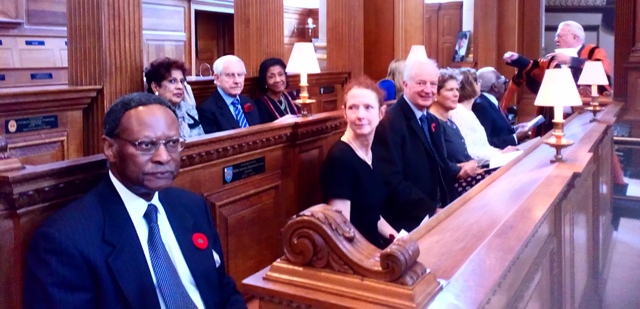 Chief Emeka Anyaoku delivered one of the addresses at St Bride's Church in London [photo: Debbie Ransome].
Chief Emeka Anyaoku delivered one of the addresses at St Bride's Church in London [photo: Debbie Ransome].
A Service of Thanksgiving for Derek Ingram was held on 8 November at St Bride’s Church, off Fleet Street in London. Derek Ingram, who died in June of this year, was a founding member of the Commonwealth Journalists Association (CJA), the writer of The Round Table’s Commonwealth Update for many years and a member of the Round Table’s editorial board.
Former Commonwealth Secretary-General Chief Emeka Anyaoku delivered one of the addresses at the service. His address is reproduced here:
Derek Ingram, who died on June 17, 2018 just three days before his 93rd birthday, lived a fulfilled life. This memorial service is therefore an occasion to celebrate his life and his remarkable achievements.
Derek was a journalist of undisputed distinction. He practiced his journalism with undeviating adherence to the core purpose of a good journalist which “is to research, document, write and present news in an honest, ethical and unbiased way”.
I first met Derek Ingram in 1967 just after he had left the Daily Mail newspaper where he had worked for 17 years and risen to the post of Deputy Editor. This was the year in which he with his friend, Oliver Carruthers, founded the Gemini News Service, as a pioneering news agency with specialization in international and development journalism. That naturally brought him into close association with Marlborough House the headquarters of the Commonwealth Secretariat and the first Commonwealth Secretary-General, Arnold Smith.
Although he dealt on a more regular basis with my colleagues such as Patsy Robertson in the then Information Division, we in the International Affairs Division also interacted with him from time to time because of his special interest in the Commonwealth which was then being transformed by Arnold Smith from being a shadow of the erstwhile British Empire to becoming an independent organization of sovereign nations.
As editor of the Gemini News Service from its founding in 1967 to 1993, Derek came to be widely regarded as a most prominent and knowledgeable writer on issues related to the Commonwealth of Nations.
Because of time constraint, I would like in remembering Derek to mention only three memorable recollections of my close association with him.
The first was in May 1990 when he, along with David Martin Africa Correspondent of the Observer newspaper, and the Canadian author Phyllis Johnson who subsequently wrote and published my biography titled Eye of Fire, visited and stayed with my wife and me in my ancestral home at Obosi, a village in South East of Nigeria. I was there on a retreat to contemplate on what would be my main mission on assuming the office of Commonwealth Secretary-General later in July of that year.
We talked extensively at Obosi against the background of the seemingly justifiable charge, especially in the conservative media, of hypocrisy against Commonwealth Governments for their relentless campaign against white minority regimes in Southern Africa, while at the same time tolerating no less than ten Commonwealth member countries, including my own country Nigeria, which were then under either military rule or one-party government. Derek reinforced my determination to have among my priorities as Secretary-General, to work for the Commonwealth to become a potent force for promoting its fundamental values including especially, democracy, good governance and human rights.
The second was in 1994 when I appointed Derek as a member of the Commonwealth group which went to observe the elections that ushered in democracy in South Africa with Nelson Mandela as the country’s first democratically elected President. I remember well in our conversation on that occasion, his enthusiastic satisfaction as he reminded me that he had in 1967 resigned as Deputy Editor of the Daily Mail because of what he saw as the paper’s “colonial attitude” towards apartheid.
My third memorable interaction with Derek was in 1997 when I commissioned him to advise the Secretariat on how the Commonwealth could enhance its image and operations. It was a task that took him to several Commonwealth countries in Africa, Asia, the Pacific and the Caribbean. I believe that the Commonwealth still stands to gain from the implementation of many of the recommendations he put forward in his report.
Derek was a true believer in the Commonwealth and its yet-to-be-fully-tapped potential in the service of humanity. He often said “My view remains that the Commonwealth is….still historically in its early days”. His belief in the Commonwealth was rooted in a deep knowledge of the organization’s consultative and practical activities having attended many of its conferences including no less than 20 meetings of Commonwealth Heads of Government.
If I may conclude by mentioning just three of his accomplishments:
- Derek Ingram through the Gemini News Service mentored and inspired very many young journalists in several developing Commonwealth countries and Canada;
- in 1978, he along with some other journalists at a conference in Dalhousie, Canada, played a leading role in setting up the Commonwealth Journalists Association which went on to provide training opportunities for journalists across the developing world;
- and in 1987, he in the words of Richard Bourne, “was a key player in the establishment of the Commonwealth Human Rights Initiative, now with offices in Delhi, Accra, and London”.
In sum, I believe that Derek Ingram will long be remembered as a conscientious journalist and a towering and indefatigable champion of the Commonwealth and its fundamental principles.
Related articles:
Derek Ingram – An Appreciation – Round Table, October 2018
Remembering Derek Ingram – Round Table June 2018
CJA Newsletter on Derek Ingram



